- Students for Fair Admissions revealed a handbook that provides guidelines for scoring applications for Harvard University admissions officers.
- Recommendations letters that had phrases like “the best ever” received high scores.
- The dean of admissions defended admitting students with relations to donor as important for the university’s “long-term strength.”
A group opposed to affirmative action in higher education presented a handbook Wednesday that showed Harvard University’s guidelines when scoring applicants.
Students for Fair Admissions (SFFA) filed a lawsuit against Harvard for racial discrimination against Asian-American students in 2014. The university is now on trial in a Boston federal court in front of U.S. District Judge Allison Burroughs. (RELATED: Harvard Dean Defends Race-Based Admissions On First Day Of Trial)
The third day of trials focused on a handbook used since 2014 that instructs admissions officers how to grade applications. The Wall Street Journal published a copy of the handbook Wednesday.
Admissions officers consider GPA, test scores, extracurricular, community and family activities, athletic abilities, school support and personal qualities.
Applicants were given overall ratings that ranged from “Negative” to “Tops for admissions,” based on how they scored on the various categories, according to the handbook:
Overall
1. Tops for admission: Exceptional — a clear admit with very strong objective and
subjective support (90+% admission).
2. Strong credentials but not quite tops (50-90% admission).
3. Solid contender: An applicant with good credentials and support (20-40% admission).
4. Neutral: Respectable credentials.
5. Negative: Credentials are generally below those of other candidates.
6. Unread.
Those with near or perfect scores and grades were rated as “1” and had the potential to graduate with the highest honors at the school. Students with SAT scores in the mid- to high-700s or an ACT score at or above 33 had the potential for the second highest honors at the university while students with the potential to earn the third highest honors scored between the mid-600s to low-700s on the SATs or between 29 and 32 on the ACTs. Those determined to be adequately prepared in academics had SAT scores in the 600s and ACT scores between 26 and 29.

Different groups of supporters attend the “Rally for the American Dream – Equal Education Rights for All,” ahead of the start of the trial in a lawsuit accusing Harvard University of discriminating against Asian-American applicants, in Boston, Massachusetts, U.S., Oct. 14, 2018. REUTERS/Brian Snyder
Applicants needed to have unusual strength or even a national achievement to be considered as excellent in extracurricular activities while those who barely participated in activities could still get a neutral or respectable rating.
Personal ratings were generally determined by recommendations from teachers and counselors and an interview with a Harvard alumnus, Dean of Admissions William Fitzsimmons said Tuesday. He added that Asian-American students had weaker recommendations than white students.
Recommendations letters that had phrases like “the best ever” or “one of the best” had high school support scores.
Personal ratings were broken down into six different categories, though it was not explicitly said what determined an “outstanding,” “bland” or “questionable” personality.
Legacy status, an applicant who is the child of a Harvard undergraduate alumnus, is also considered in the application process, a Harvard official told The Daily Caller News Foundation in an email.
The official added that Asian-American legacy applicants increased by 29 percent from the 2016 to 2019 class pools.
Fitzsimmons also defended Harvard’s admittance of students who were related to donors, saying that it was “important for the long-term strength of the institution” like securing scholarship, The Harvard Crimson reported.
Applicants related to donors could be included on special lists like the “Dean’s Interest List” or “Director’s Interest List,” according to The Crimson.
The names on these lists are sometimes given to the dean by the University Development Office, which seeks alumni donations. Those on the special lists were accepted at a 42.2 percent rate between the class of 2014 and class of 2019, The Crimson reported.
Early admits to the school were accepted at 14.5 percent while regular admits were accepted at 4.59 percent.
All content created by the Daily Caller News Foundation, an independent and nonpartisan newswire service, is available without charge to any legitimate news publisher that can provide a large audience. All republished articles must include our logo, our reporter’s byline and their DCNF affiliation. For any questions about our guidelines or partnering with us, please contact licensing@dailycallernewsfoundation.org.


